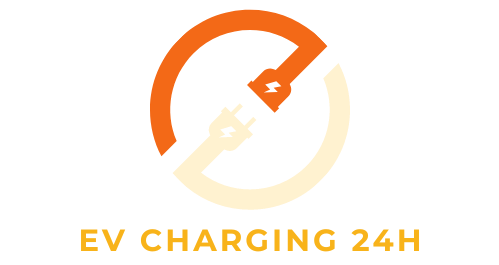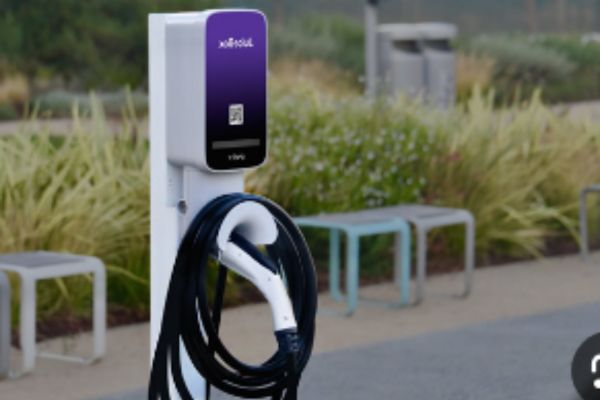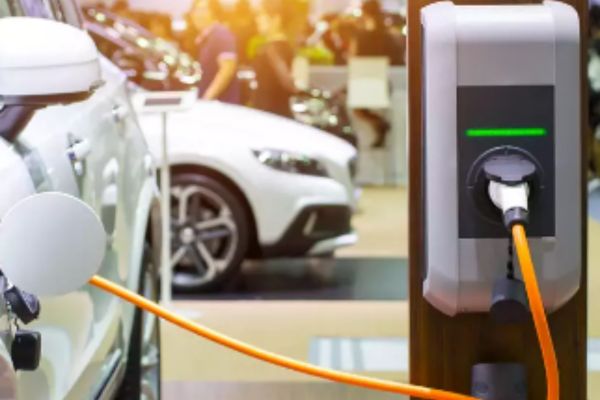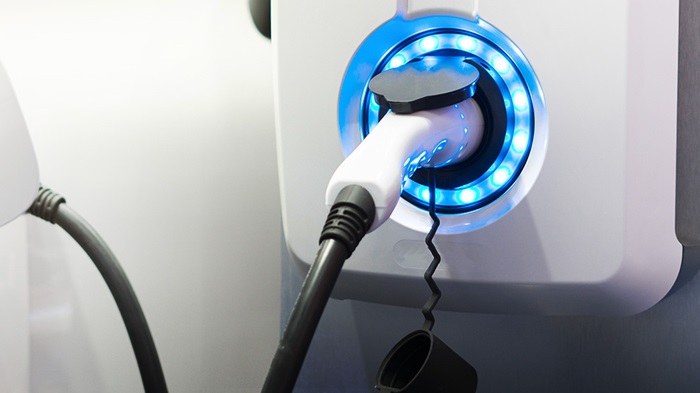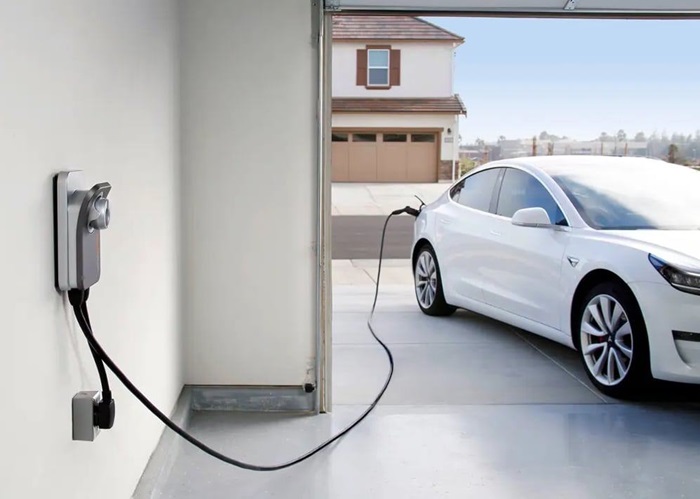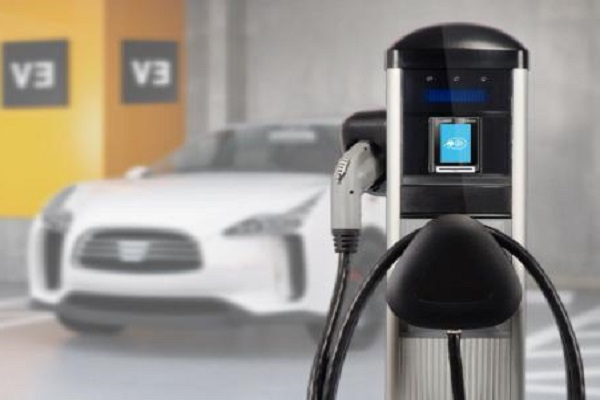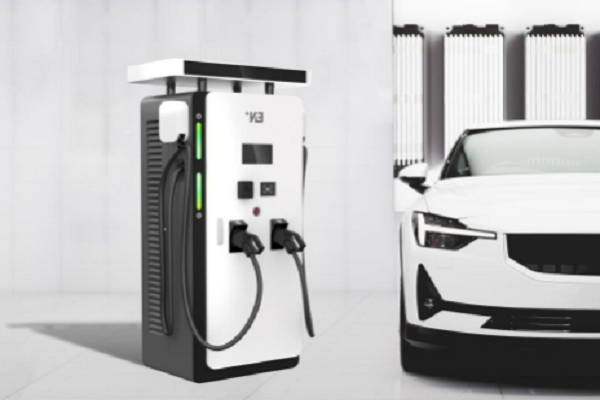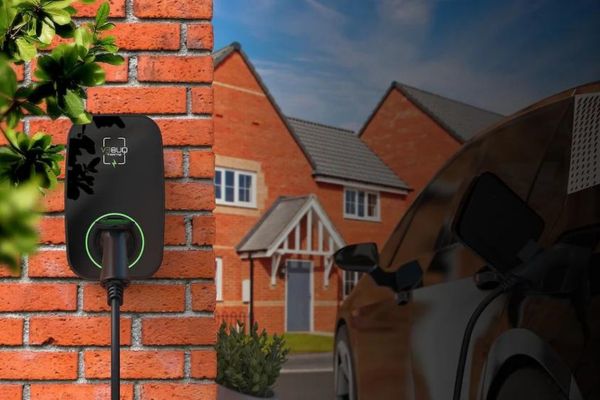Smart EV Charger Cost in 2024: What You Need to Know Before Buying
It is imperative that owners of electric vehicles who are thinking about upgrading their charging system comprehend how much a smart EV charger costs. In addition to quicker charging times, these chargers come equipped with cutting-edge functions like scheduling and remote management via smartphone apps.
Depending on the brand, features, and installation requirements, the cost varies significantly. This article will delve into the various price points and factors influencing the cost of smart EV chargers, helping you make an informed decision that balances functionality with budget.
Whether you’re looking to cut charging times or integrate with your smart home systems, we’ll guide you through the cost landscape of today’s top smart EV chargers.
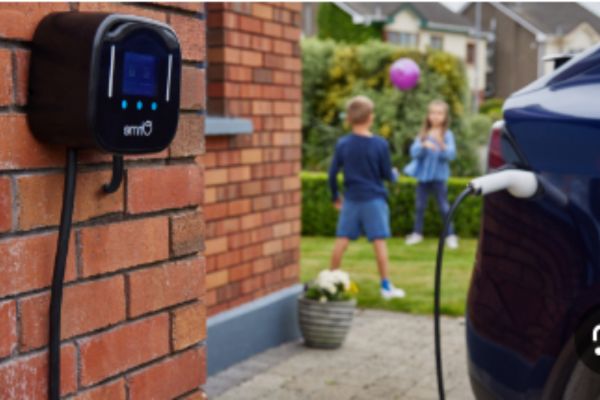
Introduction
The automotive landscape is witnessing a profound shift towards sustainability, with electric vehicles (EVs) playing a pivotal role. Central to the widespread adoption of EVs are smart EV chargers, which have emerged as indispensable components in the infrastructure supporting electric mobility. These intelligent chargers not only facilitate the charging process but also offer a range of features aimed at optimizing efficiency, enhancing the user experience, and integrating seamlessly with smart grid technologies.
Smart EV chargers are important, and their growth is significant.
Smart EV chargers have garnered significant attention due to their ability to address key challenges associated with EV adoption, such as range anxiety, charging infrastructure availability, and grid management. These chargers enable more convenient and reliable charging experiences for EV owners by offering functionalities such as remote monitoring, scheduling, and dynamic pricing.
Moreover, they play a crucial role in balancing electricity demand, integrating renewable energy sources, and enabling vehicle-to-grid (V2G) capabilities, thus contributing to the overall sustainability of the transportation sector.
Several factors, including technological advancements, supportive government policies, increasing consumer awareness, and the expanding EV market, have propelled the growth of smart EV chargers. We expect the deployment of smart charging infrastructure to escalate, driving innovation and further enhancing the capabilities of these chargers as the demand for electric vehicles continues to surge worldwide.
Overview of the Guide’s Objectives
This guide aims to provide readers with a comprehensive understanding of smart EV chargers, their significance in the automotive landscape, and the evolving trends shaping their development and deployment. Through detailed insights, practical examples, and actionable recommendations, readers will gain an understanding of the following topics:
- We will explore the fundamentals of smart EV chargers and their underlying technologies.
- EV owners, utilities, and society at large can benefit from smart charging solutions.
- There are best practices for implementing and managing smart charging infrastructure.
- Case studies highlight successful deployments and real-world applications.
- The future outlook and emerging opportunities in the smart EV charging sector are significant.
Understanding smart EV chargers
A smart EV charger is an advanced charging station that goes beyond simply delivering electricity to your electric vehicle (EV). They employ built-in intelligence and connectivity features to provide a more sophisticated charging experience.
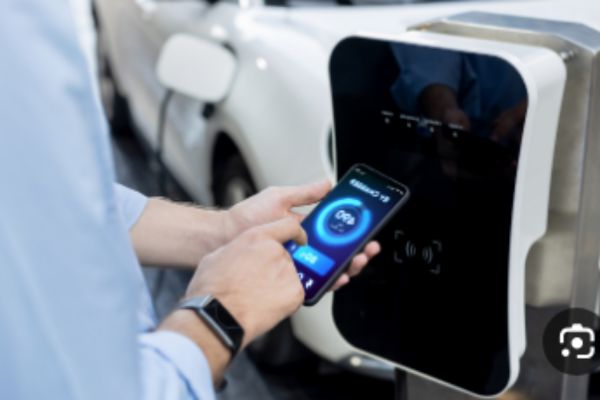
How do they differ from standard chargers?
Standard EV chargers, typically provided by the car manufacturer, are basic and offer limited functionality. They simply connect to your car and deliver a fixed amount of power.
On the other hand, smart EV chargers offer a range of features, including
- Wi-Fi and app connectivity allow for remote monitoring and charging control via a smartphone app.
- Smart scheduling: It enables you to schedule charging sessions for off-peak hours when electricity rates are lower, potentially saving you money.
- Real-time charging information: Provides data on charging speed, energy consumption, and estimated time to completion.
- Safety features may include overload protection, ground fault detection, and surge protection.
- Integration with home energy management systems: This allows for optimizing charging based on real-time electricity usage and potentially integrating with renewable energy sources like solar panels.
Types of Smart EV Chargers
There are various smart EV chargers available on the market, each with its own set of features and functionalities. Here are a few popular examples:
Grizzl-E Smart: This is a Wi-Fi-connected charger that offers app control, real-time charging data, and safety features. It is available in various configurations to support different power outputs and amperages.
The Grizzl-E Ultimate is a more advanced version of the Grizzl-E Smart charger, offering additional features like integrated power sharing for managing multiple EVs and the ability to connect to home energy management systems.
Specifically designed for Tesla vehicles, the Tesla Wall Connector is a home charger. It offers a sleek design, fast charging speeds, and seamless integration with the Tesla mobile app.
Key Features and Technological Advancements
Smart EV charger technology is constantly evolving, with new features and functionalities emerging at the same time. Here are some key trends to watch:
- Voice control integration: Some chargers allow for voice control through smart home assistants like Google Home or Amazon Alexa.
- Load management: Certain chargers can dynamically adjust charging power based on other household electrical demands, preventing circuit overloads.
- Bi-directional charging: This cutting-edge technology not only charges EVs but also feeds power back into the grid during peak hours, enhancing grid stability.
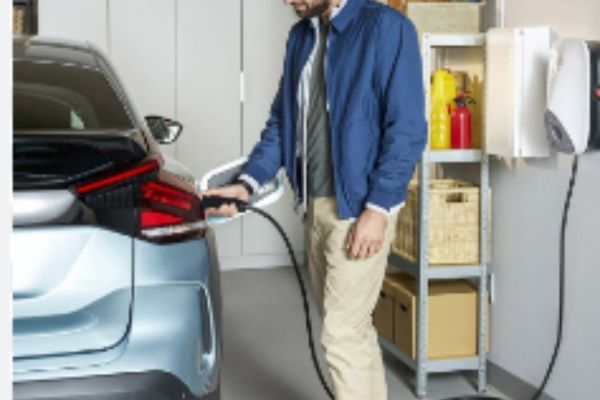
The initial purchase costs of smart EV chargers are significant.
As electric vehicles become more commonplace, the market for EV chargers has expanded, offering a diverse range of smart EV chargers at varying price points. Several factors, including brand, features, power output, and connectivity options, influence the cost of these chargers. This section explores the price range of different models and brands, compares the cost-effectiveness of top models, and examines how technological features impact pricing.
The price range varies for various models and brands.
The cost of smart EV chargers can vary significantly depending on the model and brand. Generally, prices can range from around $200 for basic models to over $1,000 for high-end versions with advanced features.
Basic Level 2 Chargers: These chargers typically cost between $200 and $500. They offer faster charging than Level 1 chargers but may have limited smart features.
Mid-range Smart Chargers: Priced between $500 and $800, these chargers often include connectivity features like Wi-Fi or Bluetooth, basic scheduling, and some form of energy usage monitoring.
High-End Models: With dynamic load balancing, integration with home energy management systems, and the capacity to react to utility rates and demand response programs, these models range in price from $800 to over $1,000.
Popular brands such as ChargePoint, JuiceBox, and Tesla, as well as offerings from car manufacturers like Ford and BMW, span this range, with higher-end models often corresponding to the brand’s premium market positioning.
Comparison of Cost-Effectiveness Among Top Models
When comparing cost-effectiveness, it’s crucial to consider both the upfront cost and the potential savings over time due to features like energy management and reduced charging times. Here are some of the top models and their respective value considerations:
Tesla Wall Connector ($500–$550): Specifically designed for Tesla vehicles, this charger offers high-speed charging and smart features through integration with the Tesla app at a moderate price for Tesla owners.
Enel X JuiceBox ($650–$900): Known for its robust app and high power output, the JuiceBox can be a cost-effective option for users looking to maximize charging speed and utilize detailed energy tracking and scheduling.
ChargePoint Home Flex ($749): This charger is versatile with adjustable amperage and has extensive smart capabilities, making it a good long-term investment for EV owners who value flexibility and integration with home energy systems.
Impact of Technological Features on Pricing
The inclusion of advanced technological features significantly impacts the price of smart EV chargers. Features such as enhanced connectivity options (e.g., Wi-Fi, Ethernet, Cellular), higher amperage capacities, and sophisticated software capabilities for integration with smart homes or renewable energy sources typically drive up costs.
Furthermore, durability and warranty offerings can influence pricing, with more robust models promising longer lifespans and comprehensive customer support justifying higher price tags.
Installation Costs of Smart EV Chargers
While the purchase price of a smart EV charger gives you a sense of the initial investment, the total cost also involves installation, which can vary widely based on several factors. Understanding these costs and choosing the right installation provider are crucial steps in getting your EV charging station up and running effectively.
This section provides a breakdown of average installation costs, explores factors that influence these costs, and offers guidance on selecting the right installation provider.
We provide a breakdown of average installation costs by model.
Installation costs for smart EV chargers can vary significantly, depending on the specific model and the complexity of the installation required. Here are some general guidelines:
- Basic Level 2 Chargers: Installation costs for these chargers typically range from $300 to $600. These chargers are generally less complex to install than more advanced models, assuming existing electrical wiring supports the charger.
- Mid-Range Smart Chargers: Installation for these can range from $600 to $1,200. Integrating and configuring additional features, such as connectivity and remote monitoring, increases the cost.
- High-End Models: Installing these can cost anywhere from $1,000 to $2,000, especially if significant electrical upgrades are required or if the charger integrates with a home energy management system.
Factors Influencing Installation Costs
Several key factors can influence the cost of installing a smart EV charger, including:
- Labor: The complexity of the installation, as well as the rates charged by electricians or specialized installers, can have a significant impact on costs. Installations that require extensive wiring, circuit additions, or complex integrations with home systems typically require more labor.
- Many local governments require permits to install EV charging stations. The cost of these permits can vary depending on the location and the installation’s specific requirements.
- Electrical Upgrades: Older homes or buildings may need significant electrical system upgrades to support the high power requirements of EV chargers. This can include upgrading the panel, adding new circuits, and installing new wiring, all of which can substantially increase costs.
Choosing the Right Installation Provider
Selecting the right installation provider is essential for a safe and efficient setup. Here are some key features to keep in mind, as well as a list of recommended installation providers:
- Certification and Experience: Choose a provider with certified electricians who have specific experience installing EV chargers. Certifications from reputable organizations in your region, such as the National Electrical Contractors Association (NECA) in the U.S., can indicate a high level of expertise.
- Reviews and Recommendations: Look at customer reviews and ask for recommendations from other EV owners. Providers with positive feedback are typically a safer choice.
- Warranty and Support: Ensure that the installer offers a warranty for their work and can provide ongoing support for any issues that arise after installation.
Recommended Providers:
- Tesla’s Recommended Installers: When buying a wall connector, using Tesla’s network of recommended electricians ensures that the installation will meet Tesla chargers’ unique needs.
- Qmerit: Widely recognized across North America, Qmerit specializes in EV charger installations and offers a network of certified installers.
- ChargePoint Certified Installers: For those purchasing a ChargePoint charger, using their certified installers can be beneficial because they are familiar with the company’s products and installation procedures.
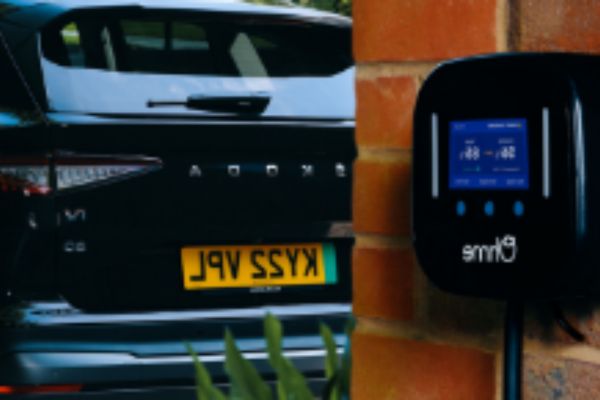
Additional and Operational Costs
When setting up a smart EV charger, the purchase price and installation are just part of the total cost. There are also additional accessories, potential unexpected costs, and ongoing operational expenses to consider. Understanding these can help you budget more accurately and avoid surprises.
Necessary Accessories and Their Costs
Installing a smart EV charger may require or benefit from the following accessories:
- Mounting brackets typically range from $30 to $100, depending on the charger model and the complexity of the mounting setup.
- To prevent unauthorized use, safety locks or secure mounting solutions can cost anywhere from $25 to $50.
- Cable Management Systems: To keep charging cables neatly stored and prolong their lives, cable organizers or holders are available for around $20 to $60.
Unexpected Costs
- Electrical System Upgrades: In some cases, older homes may require a substantial upgrade to the existing electrical panel or wiring to handle the additional load of an EV charger. This can cost anywhere from $1,000 to over $2,500.
- Permitting Fees: Depending on the location, obtaining the necessary permits can add several hundred dollars to the installation cost.
Ongoing operational costs
- Electricity Consumption: Your local rates and charging frequency will determine the cost of the electricity the charger uses. For example, charging an EV that has a 60-kWh battery from empty to full at a residential electricity rate of $0.13 per kWh would cost about $7.80.
- Most modern EV chargers are quite efficient, with efficiency rates ranging from 85% to 95%. However, energy losses during charging can have a small impact on operational costs. Choosing a charger with a high efficiency rate can help minimize these costs.
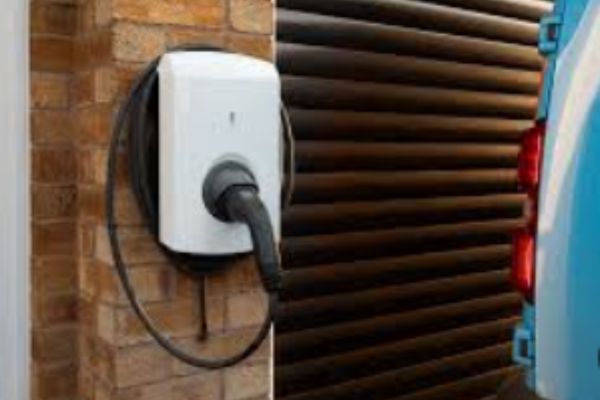
Compatibility and integration
The effectiveness of a smart EV charger isn’t just about its standalone capabilities; it’s also about how well it integrates with your vehicle and home energy systems.
Compatibility Issues
- Charger and Vehicle Compatibility: Most modern EV chargers use a standard J1772 connector compatible with all EVs in North America, except for Tesla, which requires an adapter. Ensure the charger’s maximum output doesn’t exceed what your vehicle can accept.
- Software Compatibility: Check that the charger’s software is compatible with any existing home automation systems and that it supports updates to maintain compatibility with new vehicle models and technologies.
Integration with smart home systems
- Smart Home Compatibility: Some smart chargers integrate directly with home management systems, allowing for advanced scheduling and energy management. You can program chargers to only use power during off-peak hours or when your solar panels are producing excess energy.
- Maintaining Functionality Updates: Smart chargers typically require occasional software updates to improve features and maintain compatibility with all connected systems. These updates are usually free, but it’s important to make sure your charger can easily receive them via Wi-Fi or another connection method.
Incentives and rebates
Various governmental and local incentives often encourage the adoption of electric vehicles (EVs), significantly reducing the upfront and ongoing costs associated with smart EV chargers.
Available Governmental and Local Incentives
- Federal Incentives: Many countries offer federal rebates or tax credits for the purchase and installation of EV charging equipment. For example, in the United States, homeowners can take advantage of the federal tax credit that covers 30% of the cost of purchasing and installing an EV charger, up to a maximum of $1,000.
- State and Local Incentives: Additional rebates and incentives can vary widely depending on the state or locality. These might include cash rebates, reduced electricity rates for EV charging, or even free chargers provided by utility companies.
We provide application processes for incentives and standard savings.
- How to Apply: The application process for these incentives typically involves submitting proof of purchase and installation from a certified electrician. Some programs require pre-approval before purchase.
- Typical Savings: Depending on the incentive, expenditures can vary significantly. For example, combined federal and state incentives can reduce the cost of a smart charger by more than 50% in some regions.
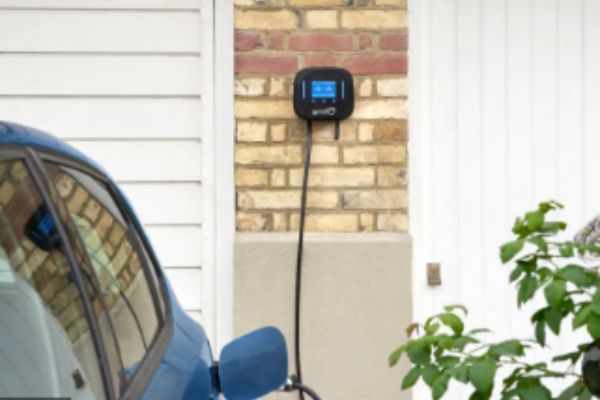
Environmental Impacts and Energy Sources
Smart EV chargers not only support the growing use of electric vehicles, but also play a crucial role in increasing the environmental benefits associated with them.
The use of smart EV chargers provides significant environmental benefits.
- Reduced Emissions: Charging an EV produces significantly lower emissions of greenhouse gases and pollutants compared to operating gasoline or diesel vehicles, especially if the electricity comes from renewable sources.
- Enhanced Grid Management: By programming smart chargers to charge during off-peak hours, we can reduce strain on the electrical grid and better utilize renewable energy sources when they are most available.
There are options for powering chargers with renewable energy.
- Solar Panels: Integrating solar panels with EV charging systems can greatly reduce the carbon footprint of charging an EV. Home solar energy systems can directly interface with many smart chargers, enabling vehicles to run entirely on renewable energy.
- Other Renewable Sources: Purchasing green energy through your utility or installing other renewable energy systems, such as wind turbines, can also help ensure that your EV charging is as environmentally friendly as possible.
We are having a discussion about the overall reduction of the carbon footprint.
- Impact Assessment: The overall reduction in carbon footprint from using an EV with a smart charger depends on several factors, including the source of electricity. If the electricity comes from renewable sources, the reduction is significant. However, even when charged from a grid that includes fossil fuels, EVs tend to have a lower overall carbon footprint compared to conventional vehicles.
- Lifecycle Emissions: Considering the full lifecycle of the vehicle and charger, including manufacturing and eventual disposal, EVs still generally represent a reduction in emissions compared to traditional vehicles, especially as technology advances and recycling processes improve.
Incentives make smart EV chargers more accessible, and their integration with renewable energy sources ensures they contribute positively to reducing environmental impacts. This blend of technology, policy support, and consumer behavior is key to achieving broader environmental goals.
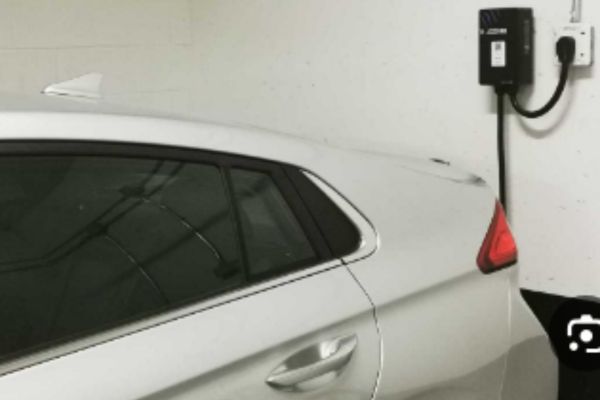
Installation: DIY vs. Professional
Choosing between DIY and professional installation for smart EV chargers involves considering safety, expertise, cost, and the potential risks. Each option has its advantages and disadvantages, depending on the individual’s technical skills and the specifics of their home electrical system.
We are comparing the pros and cons of DIY versus professional installations.
DIY Installation
Pros:
- Cost Savings: Typically, you can save on labor costs by doing the installation yourself.
- Flexibility: You have the freedom to decide when and how to complete the installation, possibly at your own pace.
- Personal Satisfaction: Completing the installation yourself can provide a sense of accomplishment and deeper knowledge of your home’s electrical system and the charger’s operation.
Cons:
- Safety Risks: If not done correctly, electrical installations pose risks, including potential electric shock and fire hazards.
- Time-consuming: Without professional tools and experience, the installation process can be lengthy and challenging.
- Potential for Errors: Mistakes can lead to additional costs or a need for professional intervention, possibly voiding warranties.
Professional Installation
Pros:
- Expertise and Safety: Professionals have the necessary tools, knowledge, and certifications to ensure the installation is safe and compliant with local codes.
- Convenience: Hiring a professional can significantly reduce the personal time investment and stress involved in the project.
- Warranty and Support: Many professional installations come with added warranties and support for the work performed, which can be beneficial long-term.
Cons:
- Higher Cost: Professional installation will incur labor costs, which can be substantial depending on the complexity of the job.
- Scheduling: You may need to work around the installer’s schedule, which can delay the project.
Safety considerations and the necessary technical skills for a DIY project are crucial.
- Electrical Knowledge: Understanding electrical systems is critical, including your home’s electrical capacity, grounding techniques, and local electrical codes.
- Proper Tools: Having the right tools is essential, such as voltage testers, drills, wire strippers, and the appropriate personal protective equipment.
Cost comparison and risk assessment
- Cost Comparison: While DIY installation might save on initial labor costs, any errors can lead to additional expenses, such as repairs or even fines if the installation is not up to code. Professional installation might seem expensive upfront, but it typically offers greater assurance and fewer surprise costs.
- Risk Assessment: The primary risks associated with DIY include personal injury and potential property damage, as well as the risk of improper installations like electrical fires. Professional installations mitigate these risks significantly through expertise, and they typically carry insurance to cover damages.
Warranties, Insurance, and Legal Considerations
Details on Warranties and What They Cover
When purchasing an electric vehicle (EV) charger, understanding the warranty terms is essential. Most EV chargers come with a manufacturer’s warranty that typically covers:
- Defects in Materials and Workmanship: This includes any flaws in the construction or materials used in the charger. If the charger fails due to these reasons within the warranty period, the manufacturer will repair or replace it.
- Duration: Warranties usually range from one to five years, depending on the manufacturer and model. Some high-end chargers might offer extended warranties.
- Specific Components: Certain parts of the charger, such as cables and connectors, may have separate warranty terms.
- Conditions and Limitations: Warranties often specify conditions under which coverage is valid, such as proper installation by a certified electrician and use in accordance with the manufacturer’s guidelines. The warranty may not cover misuse, unauthorized modifications, or damage from external sources like power surges.
Chargers have insurance options.
In addition to warranties, insuring your EV charger can provide additional peace of mind. Here are some insurance options to consider:
- Homeowner’s Insurance: You can extend many homeowner’s insurance policies to cover EV chargers. This coverage typically protects against damage from events like fire, theft, or vandalism.
- Specific EV Charger Insurance: Some insurers offer specialized policies or riders for EV chargers. These policies may offer more comprehensive coverage, including protection against accidental damage.
- Liability Coverage: If you place your charger in a public area, liability coverage can protect you in the event that someone sustains an injury while using it.
Consulting with your insurance provider will help determine the best coverage options based on your needs and the specifics of your charge.
Regulatory and compliance issues
Installing an EV charger involves adhering to various regulatory and compliance issues to ensure safety and legality:
- Building Codes and Permits: Depending on your location, installing an EV charger might require building permits. To ensure a safe installation, adhere to the standards set by local building codes for electrical work.
- Electrical Standards: Installations must comply with national and local electrical codes, such as the National Electrical Code (NEC) in the United States or similar standards elsewhere. This includes using proper wiring, circuit protection, and grounding.
- Zoning Regulations: Zoning laws might affect where you can install a charger, particularly for public or commercial installations. Residential installations typically have fewer restrictions but still need to adhere to property and safety regulations.
- Professional Installation: A number of warranties and local codes require licensed electricians to install EV chargers. This ensures that the installation meets all safety and regulatory requirements.
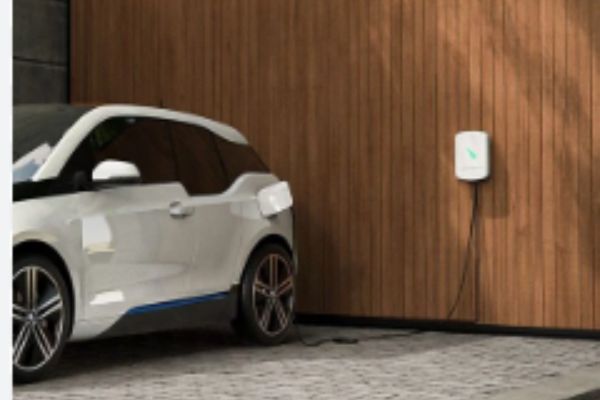
Smart Features and Connectivity
Exploration of smart features
App Integration and Remote Monitoring
Modern EV chargers often come equipped with smart features that enhance the user experience and functionality. Two key features are app integration and remote monitoring.
- App Integration: Many EV chargers offer mobile apps that allow users to control and monitor their chargers from anywhere. These apps typically provide functionalities such as starting or stopping charging sessions, scheduling charges, and viewing real-time charging status.
- Remote Monitoring: This feature enables users to track their charger’s performance remotely. Users can receive notifications about the charging status, track energy consumption, and get alerts if there are any issues, such as a fault or interruption in the charging process.
Advanced smart features
- Load Management: Some smart chargers can optimize charging times based on electricity rates or grid demand, helping users take advantage of off-peak rates.
- Energy Usage Reports: Detailed reports on energy consumption can help users understand their charging habits and manage their energy costs more effectively.
- Firmware Updates: Smart chargers can receive over-the-air firmware updates, ensuring they always have the latest features and security enhancements.
Connectivity has significant benefits for managing usage and schedules.
Connectivity offers several benefits for managing EV charging:
- Efficiency: By scheduling charging sessions during off-peak hours, users can reduce energy costs and alleviate grid demand. This is particularly useful for people with time-of-use electricity plans.
- Convenience: Remote control via mobile apps means users can manage their charging without needing to be physically present. This is especially handy for starting or stopping a charge while away from home.
- Optimization: Connectivity allows for better energy management. For example, users can configure their chargers to use solar power when it is available or to charge during times when renewable energy is more abundant on the grid.
- Troubleshooting: Remote diagnostics can detect problems early, sometimes enabling resolution without a service visit.
Compatibility with Other Smart Home Technologies
Integrating EV chargers with other smart home technologies can enhance both convenience and energy efficiency.
- Home Automation Systems: Many EV chargers are compatible with home automation platforms like SmartThings, HomeKit, or Hubitat. This allows users to create routines and automations. For example, you can set your charger to start charging automatically when you arrive home or when your solar panels produce excess energy.
- Virtual Assistants: Compatibility with virtual assistants such as Amazon Alexa, Google Assistant, or Apple Siri means users can control their chargers with voice commands. This can simplify tasks like starting a charge or checking the charging status.
- Energy Management Systems: Integrating your EV charger with a home energy management system can help balance the energy load across your household, ensuring that high-demand appliances like chargers, air conditioners, and heaters operate efficiently together.
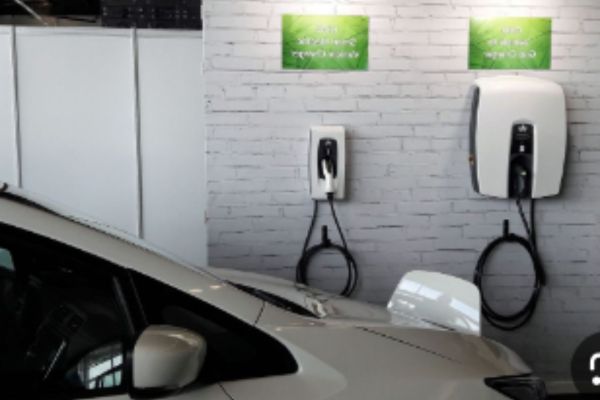
Smart EV Chargers: User Experiences and Real-Life Applications
Smart EV chargers offer a variety of benefits, and user experiences can vary depending on charger type, driving habits, and charging needs. Here are some examples:
Case Studies
- Homeowner with Level 2 Charger: Sarah commutes 50 miles daily for work. She installed a Level 2 smart charger at home. Using the app, she schedules charging for off-peak hours when electricity rates are lower. Compared to public charging, this method saves her money and guarantees her car’s full charge every morning.
- Apartment dweller with Level 1 charger: Tim lives in an apartment building and doesn’t have dedicated parking. He uses a portable Level 1 charger that plugs into a regular outlet. The smart features allow him to monitor charging remotely and ensure it doesn’t overload the circuit.
- Business Owner with Public Charging Stations: Lisa owns a restaurant and installed smart Level 2 chargers in her parking lot. The chargers integrate with a mobile payment app, allowing customers to conveniently charge their EVs while they dine. This attracts eco-conscious customers and helps Lisa promote sustainability.
Cost and benefit analyses
- Upfront Cost: The initial cost of a smart charger varies depending on the level and features. However, government rebates and potential savings on electricity bills can offset some of the cost.
- Long-Term Savings: Smart chargers can help you save money on electricity by allowing you to charge during off-peak hours. Additionally, proper charging practices with smart features can extend battery life, reducing long-term replacement costs.
- Convenience: Smart features like remote monitoring and scheduling charging sessions offer significant convenience, especially for daily commutes.
Tips from Experienced Users
- Research charger options: When choosing the right-level charger, consider your driving habits and charging requirements.
- Factor in installation costs: If you’re considering professional installation, get quotes from electricians.
- Explore available incentives: rebates and programs can significantly reduce the upfront cost.
- Utilize smart features: To optimize charging and save money, take advantage of app integration, scheduling, and monitoring.
- Plan for future needs: If you plan on getting a longer-range EV in the future, consider a charger with higher output.
We will explore future trends and innovations in EV charging.
Upcoming Technological Advancements in EV Charging
The electric vehicle (EV) charging industry is poised for significant advancements that will transform how users interact with their vehicles. We are likely to see increased integration of renewable energy sources directly into charging infrastructure, reducing reliance on non-renewable power grids.
Furthermore, battery technology advancements could bring about ultra-fast charging capabilities, allowing EVs to charge in minutes instead of hours. We anticipate the evolution of wireless charging technology, which could enable automatic charging of vehicles parked over inductive charging pads, thereby eliminating the need for manual cable connections.
We are making predictions for the future market and user trends.
Environmental concerns are driving consumer preferences, leading to a surge in EV adoption, which in turn will increase demand for more versatile and robust charging solutions. Urban and suburban areas will likely see a higher density of public charging stations to accommodate residents without private parking.
Moreover, the rise of smart home technology will encourage the development of smarter, more interactive chargers that can communicate seamlessly with home energy systems, allowing for optimized energy consumption and cost savings.
How can current users prepare for upcoming updates and changes?
For current EV owners, staying informed about technological trends and updates is crucial. Investing in smart chargers that offer firmware updates can ensure longevity and relevance in rapidly evolving markets. It’s also wise for users to consider chargers that are flexible with various power outputs to accommodate future EV models with different charging specifications.
Additionally, you can ensure the development of the necessary infrastructure in your area by engaging in community planning and advocacy. Preparing for these changes now can make the transition smoother as the new technologies become standard.
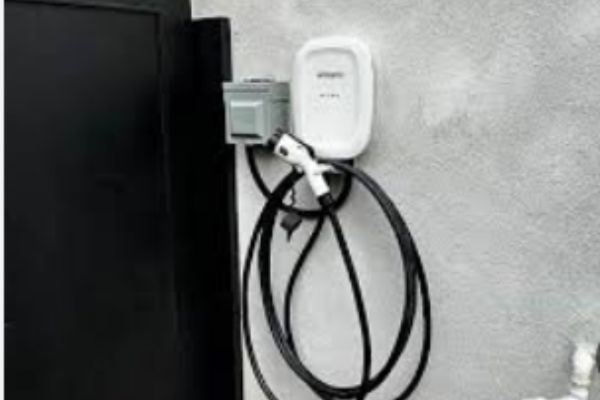
Conclusion
Throughout this discussion, we’ve explored the critical aspects and upcoming innovations in the realm of smart EV chargers. The integration of renewable energy sources, the advancement of ultra-fast and wireless charging technologies, and the anticipated increase in EV charger demand as a result of global shifts toward sustainable transportation were key points.
Investing in a smart EV charger offers considerable long-term benefits. Not only does it enhance the efficiency of charging at home, but it also aligns with the broader move towards energy-efficient technologies that can dynamically integrate with smart home systems, optimizing energy use and cost. The convenience of faster and potentially automated charging can significantly improve the user experience.
It is essential to consider the environmental impacts in addition to these practical benefits. Smart EV chargers represent a proactive step towards reducing carbon footprints and promoting renewable energy sources. As technology advances, the ability to charge EVs more efficiently will become a pivotal factor in the global push for environmental sustainability.
As we look towards a greener future, embracing these innovations in EV charging is more than just a practical decision—it’s a commitment to a sustainable lifestyle. By choosing smart EV chargers, individuals can play a vital part in shaping an eco-friendly approach to transportation that benefits both the planet and future generations.

Henry Michael is a leading expert in EV charging station research, specializing in innovative solutions for electric vehicle infrastructure. With a passion for sustainability and technological advancement, he is dedicated to advancing the accessibility and efficiency of EV charging worldwide.
